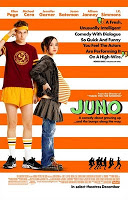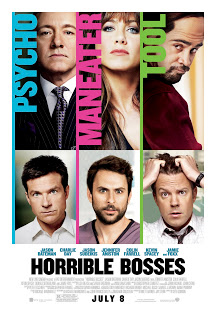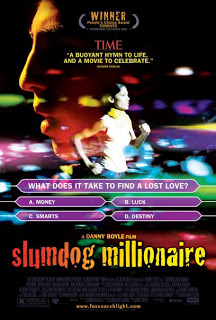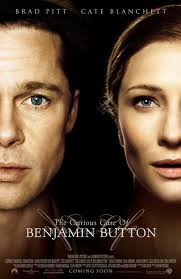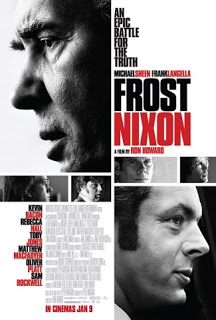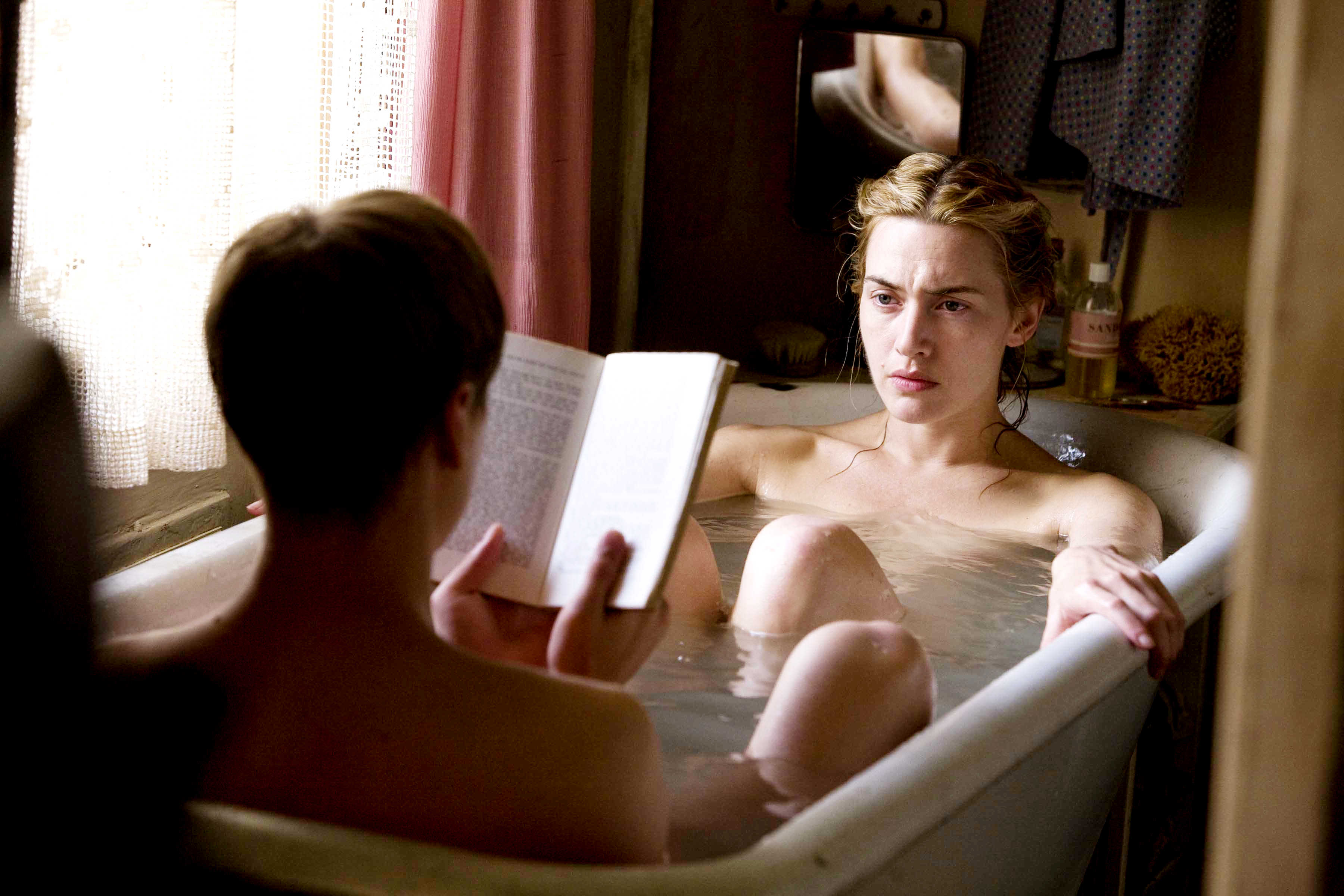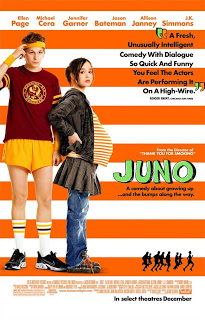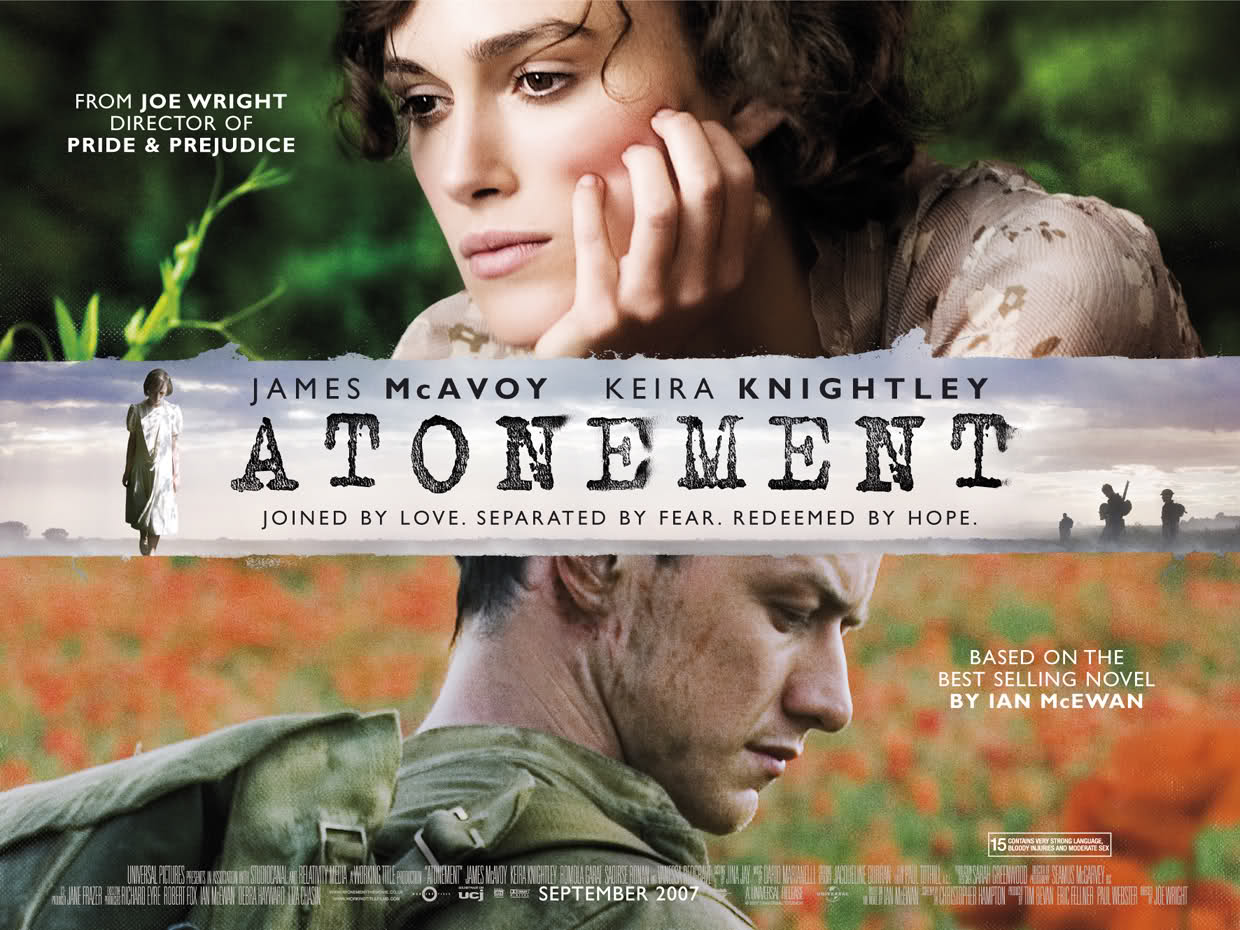Best Picture Nominee Review Series: 2008 Roundup
Juno reviewed by Amber Leab
 It’s easy to want to live in a world like this, where a pregnant sixteen-year-old seems to get by pretty well, with her parents’ support and a relationship with her baby’s adoptive family. She has a sweet teenage love affair and doesn’t seem to struggle much. While teen angst is the stuff of Hollywood cliché, things just seemed too easy for Juno. I wish my teenage years could’ve been a bit more like Juno’s. Hell, I wish my life now could be.
It’s easy to want to live in a world like this, where a pregnant sixteen-year-old seems to get by pretty well, with her parents’ support and a relationship with her baby’s adoptive family. She has a sweet teenage love affair and doesn’t seem to struggle much. While teen angst is the stuff of Hollywood cliché, things just seemed too easy for Juno. I wish my teenage years could’ve been a bit more like Juno’s. Hell, I wish my life now could be. Atonement reviewed by Marcia Herring
 Briony’s obsession with atonement, with losing herself in the quest to right the wrongs she has committed is decidedly un-feminist. Though this is, essentially, Briony’s story, her story is consumed with the stories of others, so much so that she undergoes an erasure of self to ensure the happiness of her protagonists. Briony has been stuck for her whole life revising and rewriting her story, trapped in her youth (her hair-style remains the same), only able to present the truth upon her death, and even then her tidied up version of the truth.
Briony’s obsession with atonement, with losing herself in the quest to right the wrongs she has committed is decidedly un-feminist. Though this is, essentially, Briony’s story, her story is consumed with the stories of others, so much so that she undergoes an erasure of self to ensure the happiness of her protagonists. Briony has been stuck for her whole life revising and rewriting her story, trapped in her youth (her hair-style remains the same), only able to present the truth upon her death, and even then her tidied up version of the truth.
Any deconstruction of the traditional romantic narrative does have the potential to be feminist, however in this case, because the story is filtered not only through Briony Tallis’s obsession with that very narrative but through a male author and director, the deconstruction is seen as a loss of something good. A loss of cherished innocence, of childlike femininity.
Michael Clayton reviewed by Robin Hitchcock
 It’s a terrific performance in a rich role, but unfortunately some of that richness of character is rife with sexism, or at least relies on the sexism of the audience. We first see the character breaking down in a bathroom stall, pouring sweat broadly staining the pits of her conservative blouse. Her first dialogue is anxious practice for an interview discussing her recent promotion to general counsel as she dresses in the morning. Karen sits on her hotel bed in a practical nude bra and slip, posture slumped enough that some rolls of fat form on her midsection. Rarely is a half-dressed woman so de-sexualized in Hollywood film, and that captures our interest, but only because it relies on our presumption of sexist exploitation. So much of the complexity of the character is derived from our sexist expectations of what a cold-blooded corporate killer would be like and the “feminine vulnerability” (a phrase woefully common in reveiwers’ discussions of Swinton’s performance) of Karen Crowder. Swinton’s performance is strong enough to transcend this and actually earn the mantle of “complex villain”, but it is nevertheless problematic from a feminist perspective.
It’s a terrific performance in a rich role, but unfortunately some of that richness of character is rife with sexism, or at least relies on the sexism of the audience. We first see the character breaking down in a bathroom stall, pouring sweat broadly staining the pits of her conservative blouse. Her first dialogue is anxious practice for an interview discussing her recent promotion to general counsel as she dresses in the morning. Karen sits on her hotel bed in a practical nude bra and slip, posture slumped enough that some rolls of fat form on her midsection. Rarely is a half-dressed woman so de-sexualized in Hollywood film, and that captures our interest, but only because it relies on our presumption of sexist exploitation. So much of the complexity of the character is derived from our sexist expectations of what a cold-blooded corporate killer would be like and the “feminine vulnerability” (a phrase woefully common in reveiwers’ discussions of Swinton’s performance) of Karen Crowder. Swinton’s performance is strong enough to transcend this and actually earn the mantle of “complex villain”, but it is nevertheless problematic from a feminist perspective.There Will Be Blood reviewed by Lesley Jenike
 It’s important to pause here and mention changing views concerning the portrayal of women, minorities, the disabled, and the disenfranchised at large in American films. If we consider some of our American cinematic “masterpieces,” we often find them absent vibrant female characters, for example (think The Godfather, Citizen Kane, and Chinatown to name just three). As much as I desperately want to see my gender portrayed with respect, honesty, and integrity, many films that deal with the great American mythos don’t have much room for female characters, simply because women haven’t been a part of, and are often still excluded from, the creation story we tell ourselves—a story of brutal boots-on-the-ground capitalism and, negatively speaking, punishing exploitation. It’s a Judeo-Christian story in which the individual male forges his path through the wilderness, an anti-hero who, despite his great wealth and power, can’t overcome his subsequent moral corruption. What’s important to recognize is that the marked absence of “the other” in these films is a comment on an institutionalized patriarchy that extends beyond our everyday interactions to the very heart of our cultural mythos. There Will Be Blood is yet another film that further cements a white male-dominated American story of origin.
It’s important to pause here and mention changing views concerning the portrayal of women, minorities, the disabled, and the disenfranchised at large in American films. If we consider some of our American cinematic “masterpieces,” we often find them absent vibrant female characters, for example (think The Godfather, Citizen Kane, and Chinatown to name just three). As much as I desperately want to see my gender portrayed with respect, honesty, and integrity, many films that deal with the great American mythos don’t have much room for female characters, simply because women haven’t been a part of, and are often still excluded from, the creation story we tell ourselves—a story of brutal boots-on-the-ground capitalism and, negatively speaking, punishing exploitation. It’s a Judeo-Christian story in which the individual male forges his path through the wilderness, an anti-hero who, despite his great wealth and power, can’t overcome his subsequent moral corruption. What’s important to recognize is that the marked absence of “the other” in these films is a comment on an institutionalized patriarchy that extends beyond our everyday interactions to the very heart of our cultural mythos. There Will Be Blood is yet another film that further cements a white male-dominated American story of origin. No Country For Old Men reviewed by Anna Rose
 Of course, when I say “something to do,” I mean “a grand total of ten minutes’ screentime, all of it oriented to onscreen husband Brolin.” As Carla Jean Moss, Macdonald bears an expression of chronic worriment to rival Jones’s, and almost all of her scenes require her to do nothing more than fret at Brolin, asking him for guidance or expressing concern for his safety.
Of course, when I say “something to do,” I mean “a grand total of ten minutes’ screentime, all of it oriented to onscreen husband Brolin.” As Carla Jean Moss, Macdonald bears an expression of chronic worriment to rival Jones’s, and almost all of her scenes require her to do nothing more than fret at Brolin, asking him for guidance or expressing concern for his safety.
In a way, Carla Jean ties the film together, but she does so solely in terms of the male characters: she is the only character to share screentime with all three of the main characters (who never appear onscreen together). Occasional hints are dropped regarding her life outside of the men–“I’m used to lots of things. I work at Wal-Mart”–but, frustratingly, these are not expanded in any way. Only in her final scene does she talk about something other than Llewelyn.
Guest Writer Wednesday: Horrible Bosses and the So-Called ‘Mancession’: A Review in Conversation
 |
| Horrible Bosses (2011) |
This is a guest post by Byron Bailey and Kirk Boyle.
Isn’t this movie the double-inversion of 9 to 5 (1980)? A progressive flick about exploited women enacting their (pot-induced) revenge fantasies against their bosses becomes, in these times, a reactionary tale about privileged men enacting their (resentment-fueled) revenge fantasies against their bosses. Where Parton and company hate their bosses for exploiting them, Batemen and bunch hate their bosses because they want to be (or fuck) them but can’t.
Am I being too harsh?
Byron’s Take:
The most execrable aspects of this star-studded mediocrity radiate from the characterization of Dr. Julia Harris (Jennifer Aniston) as the dirty-talking, sexually harassing dentist-boss. Now have there ever been instances of female-on-male sexual harassment in the workplace? No doubt, but the truth is that women endure unwanted sexual attention from men at an astronomically higher rate. This is yet another example of portraying the danger–as is often the case, beneath a veneer of mirth–of uncontrolled female sexuality (a very old formula indeed), here inflated into physical coercion. It has the effect of seeming to level the playing field: “See, women do it, too!” I’m not saying the makers of Horrible Bosses set out to accomplish this ideological task. They just wanted laughs, but the cumulative effect of such filmic representations has a way of getting into the cultural consciousness. Fatal Attraction (1987) unleashed its depiction of a crazed female stalker into a culture rife with male stalkers of women. Horrible Bosses presents an attractive, oversexed woman essentially stalking her hapless male employee, a scene right out of hetero male fantasy. Both films present female sexual desire as out of control.
Surely the worst moment in Horrible Bosses occurs just after Dr. Harris shows her assistant a series of photos depicting her taking advantage of him while he was under dental anesthesia. It is not clear, but some of the posed pictures may actually involve sex. The assistant (Day) says, “That’s rape!” He may well be right. She replies, “Just hold on there, Jodie Foster.” This can only refer to the 1988 film The Accused, an account of a real-life gang-rape victim whose character was essentially put on trial. (After all, she must have been “asking for it,” right?) Googling the film to get my details correct, I was met with “Jodie Foster Hot Rape Scene Video,” first result. I am not kidding. Try it. (Think we still have a problem?) So, what can Aniston’s line mean? “Don’t be so fast to accuse me like Jodie Foster did in that movie?” Or what? Because Horrible Bosses‘ point of view is that female-on-male sexual harassment is not really so bad (and most men would enjoy it if the woman were “hot”), how can this comparison of what the film sees as merely humorous, or at most embarrassing, with a filmic account of a real-life gang-rape do anything but belittle the seriousness of harassment and rape? Look, I’m not holding up The Accused as some sort of holy object, beyond humor. Laughing can help us deal with horrific things. Given the context, though, I really couldn’t believe my ears. I certainly don’t expect a mainstream comedy to conform to my ideological beliefs, but Horrible Bosses goes beyond the typical misogynistic gross-out humor so popular in recent years and graduates to the realm of the truly offensive.
As you rightly note, these three downtrodden amigos hold not just jobs but careers, and they enjoy disposable income. For example, while brewing up the idea to kill their bosses, Sudeikis mentions paying someone to clean his apartment and cut his hair. This line of thinking informs their plot to kill their bosses by hiring a hitman. Although they gripe about their jobs, any dirty work (housekeeping or murder!) is beneath them and within their means to outsource (to black men who are stupid (Jamie Foxx), but wait, might be smarter than they seem to be. Essentially, what we have is two privileged white men (Batemen and Sudeikis) whose exasperation derives from being unable to take the next step up the corporate ladder because the economy has turned sour right when they were in line for a promotion, but since the dominant ideology peddled by Hollywood cannot represent the true culprit of their thwarted desires, it displaces responsibility onto the figure of the “horrible boss.” It’s not the perverted (rotten-to-the-core) capitalist system that is to blame for your unfair treatment, it’s the perverted (bad apple) capitalist.
The logic of the third guy’s (Day) “occupational” ressentiment, as you allude to, seems different than his buddies’. Day’s character is not “trapped” because he can’t get as sweet of a position as the one he already holds within this busted economy. No, he’s trapped because he is getting married and wives-to-be are expensive commodities (and untrustworthy, cheating whores, e.g. Spacey’s character’s wife). Perhaps, however, this plot line simply serves to amplify the ever-so-slightly-less-explicit misogyny of the other two.
Perhaps too, we have reached a point in the post-ironic, late capitalist, culture industry where we need as many words for “sexism” as the Inuit have for snow. Horrible Bosses does its very best to showcase them all. Explicit misogyny: Jennifer Aniston’s character is introduced with white-lettered words that fill the screen: “Evil, Crazy Bitch.” Patronizing sexual harassment: Sudeikis’s character’s treatment of the “FedEx girl” who delivers to his company. Objectification: Sudeikis leaves a sports bar stool so he can “see that girl about her vagina.” Homophobia-as-misogyny: Aniston calls Day a “little pussy” and “little faggot” when he won’t sleep with her. Reverse-sexism-is-traditional-sexism: Aniston’s character is meant to imply that men can be sexually assaulted at work like women, but all it really reinforces is that men have a right to hate women for not fulfilling their fantasy images of them. Meta-misogyny: the outtakes include Sudeikis looking directly at the camera to remind the frat row yahoos of the film’s takeaway absurdist joke: “bend her over and show her the fifty states.” That’s not even to mention the relentless rape-is-hilarious misogyny.
Byron’s Take:
The use of “little faggot” and “little pussy” as companion terms of abuse (as you observe) unites misogyny and homophobia in one neat “little” package (pun intended). On broadcast television where the explicitness of those words calls for a cleaner alternative, the admonition “Man up!” encompasses both notions. (Why are we getting so many examples of women ordering men to be more masculine lately?) Horrible Bosses goes out of its way to police male affect, from the insufficiently masculine dental assistant (Day) to the automatically-masculine-by-virtue-of-blackness ex-con (Jamie Foxx) and his fellow bar patrons. There is, however, a moment of slippage. It occurs in the scene that follows the trio’s consultation with “Motherfucker Jones” (Foxx), their presumed hit-man. The two more successful–and in the film’s gaze, seemingly more attractive–guys (Bateman, Sudeikis) begin to argue about which of them would be raped the most if they went to prison. This works within a constellation of rape references in the film as yet another way in which white guys (with good jobs) can (potentially) get fucked (or fucked over) by someone or something. Allow me to overlay another reading. Psychological surveys suggest rather strongly that the most virulently homophobic males tend to be haunted by same-sex desire; hence, they project their loathing outward. They unconsciously know something about themselves, something that gnaws at them. This scene could be the film (or its screenwriters) expressing its/their unconscious gay desire. Additionally, the scene explores a blurring of subject positions; that is, it depicts desire and gender performance as a continuum rather than an either/or. While the film berates “faggots,” it nonetheless depicts hetero males displaying an affect that the culture defines as “feminine” (“Will they find me attractive?”). There’s a moment of complexity here, as if the film (like a human mind) knows more about itself than it thinks it knows. Still, this knowingness is itself part of a regressive network of references whose overall messages you’ve summed up perfectly, to which I would add the cultural acceptance of men being raped in prison as an eventuality that can’t–or needn’t–be avoided. (After all, they’re mostly black, right? Don’t even get me started on our rapacious prison-industrial-complex and how the “justice” system so ably feeds it).
There will probably be those who say we’re making an awfully big deal about a throw-away comedy, something that’s “just entertainment.” Unfortunately, contemptible crap like Horrible Bosses teaches the culture to affirm its worst negative stereotypes beneath a veneer of farce. (If only it were smart enough to satirize them at the same time.) Leaving these complaints aside, in the plainest terms of bang-for-the-bucks multiplex entertainment, this film is still a dismal failure. The considerable talents of Spacey, Farrell, Bateman, and Foxx are wasted, and Aniston, who can be very effective in the right role, hits an all-time low. (I guess we’re supposed to find it progressive that Aniston, at the advanced (Hollywood) age of 42, can still be displayed as a sex object. Granted, but she’s playing young, not “cougar,” which is another issue altogether.) Bateman’s character alone is marginally sympathetic, and mostly because one associates him with better material. Arrested Development is a comedic project that pushed the limits of taste, dealt with a character going to prison, presented a female character who satirized sluttiness, explored sexual orientation for laughs, had characters contemplating violence, and mixed a great many other over-the-top situations together for the sake of humor. That show illustrates how topics like these can be the occasion for genuine belly laughs, and at the same time be thoughtful and smart and not at all mean-spirited. Nearly everybody I know who watched Arrested Development–people of diverse ideological outlooks–found the show hilarious, and it was anything but safe or tame. Neither of us is asking for politically-correct comedy (which would suck), just comedy that makes us laugh without adding overtly to the negative aspects of our culture. Lately, this seems too much to expect.
Emmy Week at Bitch Flicks – Call for Writers
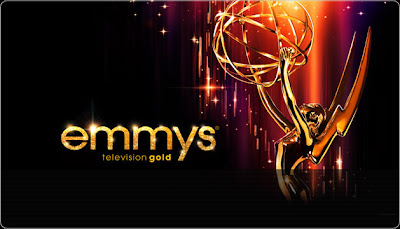 |
| The 63rd Primetime Emmy Awards: Sunday, September 18 at 8pm |
We’re looking for reviews and/or analysis of Emmy-nominated Television shows as well as character analysis of the Emmy-nominated Lead Actresses and Supporting Actresses. We’re leaving the topics wide open; the only criteria is that the analysis focuses on how the show portrays women in some way. Feel free to browse our Television category on the sidebar for examples and ideas. But we’re open to ALL proposals, so don’t limit yourselves. Finished pieces must be completed (and e-mailed to us) no later than Friday, September 2nd. We are open to original pieces and cross posts (with permission). Here are the possibilities:
Reviews and/or analysis of:
- Outstanding Comedy Series nominees
Glee- Parks & Recreation
- The Office
- Modern Family
- 30 Rock
- The Big Bang Theory
- Outstanding Drama Series nominees
- Boardwalk Empire
The Good WifeMad MenFriday Night Lights- Dexter
Game of Thrones
Character analysis pieces for:
- Outstanding Lead Actress in a Comedy Series nominees
- Cathy Jamison (Laura Linney) in The Big C
- Jackie Peyton (Edie Falco) in Nurse Jackie
Leslie Knope (Amy Poehler) in Parks & Recreation- Molly Flynn (Melissa McCarthy) in Mike & Molly
- Virginia Chance (Martha Plimpton) in Raising Hope
Liz Lemon (Tina Fey) in 30 Rock
- Outstanding Lead Actress in a Drama Series nominees
- Peggy Olson (Elizabeth Moss) in Mad Men
Tami Taylor (Connie Britton) in Friday Night LightsDetective Olivia Benson (Mariska Hargitay) in Law & Order: Special Victims UnitSarah Linden (Mireille Enos) in The Killing- Alicia Florrick (Julianna Margulies) in The Good Wife
- Harriet Harry “Korn” (Kathy Bates) in Harry’s Law
- Outstanding Supporting Actress in a Comedy Series nominees
- Sue Sylvester (Jane Lynch) in Glee
- Elka Ostrosky (Betty White) in Hot in Cleveland
- Claire Dunphy (Julie Bowen) in Modern Family
- Various Characters (Kristen Wiig) in Saturday Night Live
Jenna Maroney (Jane Krakowski) in 30 Rock- Gloria Delgado-Pritchett (Sofia Vergara) in Modern Family
- Outstanding Supporting Actress in a Drama Series nominees
- Margaret Schroeder (Kelly Macdonald) in Boardwalk Empire
- Joan Harris (Christina Hendricks) in Mad Men
- Mitch Larsen (Michelle Forbes) in The Killing
- Kalinda Sharma (Archie Panjabi) in The Good Wife
Mags Bennett (Margo Martindale) in Justified- Diane Lockhart (Christine Baranski) in The Good Wife
- All pieces must be complete and emailed by Friday, September 2nd.
- If you intend to submit, please email a brief description of your piece as soon as possible.
- Contact us at btchflcks(at)gmail(dot)com.
YouTube Break: Roseanne Barr Is Awesome
From the description at Democracy Now:
In the late 1980s and early 1990s, the Emmy Award-winning actress Roseanne Barr starred in the popular and groundbreaking show on television titled simply Roseanne, the first TV series to openly advocate for gay rights. Roseanne featured one of the first lesbian kisses on TV, in an episode when Roseanne kisses Mariel Hemingway. Roseanne was also the first sitcom to ever feature a gay marriage. The series tackled other controversial topics, as well: poverty, class, abortion and feminism. From her open support of unions in earlier shows to her tribute to Native Americans toward the end of the series, Roseanne never shied away from contentious issues. The writer Barbara Ehrenreich once praised Roseanne Barr for representing “the hopeless underclass of the female sex: polyester-clad, overweight occupants of the slow track; fast-food waitresses, factory workers, housewives, members of the invisible pink-collar army; the despised, the jilted, the underpaid.” We play excerpts from the groundbreaking sitcom and speak with Barr about her childhood in Utah, where she was raised half-Jewish and half-Mormon, and talk about how she “made it OK for women to talk about their actual lives on television.
Mad Men Week at Bitch Flicks – Call for Writers
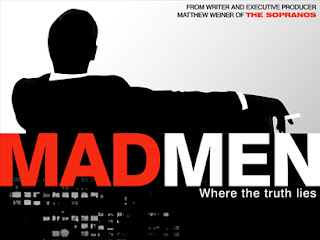 |
| Mad Men…it’s on. |
Announcing…Mad Men Week at Bitch Flicks! Monday, August 29th – Friday, September 2nd!
- All pieces must be emailed by Friday, August 26th.
- If you intend to submit, please email a brief description of your piece as soon as possible.
- Contact us at btchflcks(at)gmail(dot)com.
Need some ideas? Here are some themes you could write about (you can also propose your own):Character analysis of Betty
Character analysis of Peggy
Character analysis of Joan
Character analysis of the (individual) menThe supporting women
Sexual assault in MM
Race in MM
Betty Draper and the Feminine Mystique
Sexual harassment in the agencyMotherhood in MM
Female bodies and the male gaze of MMMM and Feminism
MM and Enlightened Sexism
Review/analysis of pivotal episode(s)
Favorite lines/moments
Fashion & the performance of the feminine
Critique of article you’ve read about the show
The possibilities are endless…
We look forward to reading your pieces for our first Theme Week here at Bitch Flicks!
Best Picture Nominee Review Series: Slumdog Millionaire
 |
| Best Picture nominee Slumdog Millionaire |
This is a guest post from Tatiana Christian.
Best Picture Nominee Review Series: The Curious Case of Benjamin Button
 |
| The Curious Case of Benjamin Button |
This is a guest post from Jesseca Cornelson.
Once I settled into the movie, however, I was able to enjoy it like the popcorn fare that it is—pleasant, but not terribly complex and with little nutritional value. My very first impression of the film was that it is one of those movies whose story is designed simply to make the viewer cry, and for me, it succeeded quite effectively in that regard. I’m a sucker for stories shaped like sadness. My second impression was to wonder why on earth I was being made to cry about the tragic love story of two imaginary white people against the back drop of Hurricane Katrina, which was a very real and epic tragedy for the city this story is set in (as well as for areas well outside New Orleans). To this second point I will return shortly.
But first, The Curious Case of Benjamin Button, based on a short story of the same name by F. Scott Fitzgerald, bears a family resemblance to another film adaption of a literary source, Forrest Gump, so I wasn’t terribly surprised to find out that screenwriter Eric Roth penned both films. In each film, we follow a quirky white boy in the south from his childhood through his adventures in adolescence and early adulthood and on into maturity. Covering such a large time span, the plots are largely episodic in nature but the feeling of an overarching structure is achieved through the protagonist’s varied and lifelong relationship with a woman he’s known since childhood. Both Benjamin’s Daisy and Forrest’s Jenny are remarkable, I think, only for their beauty and their rare understanding and appreciation of their respective misfit men. Both films also present what I think of as problematically unproblematic racial relationships. I don’t necessarily believe that every film, much less those that are comedic or fantastical in nature, needs to radically explore gender and racial relationships and stereotypes, but I suppose I don’t believe that we’re sufficiently post-racial to be able to gloss over historical struggles without such glossing over itself feeling like a distraction. And I think that’s part of what renders both TCCOBB and Forrest Gump ultimately conservative films.
Before I take on what I think is Benjamin Button’s most interesting relationship—that with Queenie, the African-American woman who adopts him, I want to talk about the film’s magical realism. While TCCOBB is clearly grounded in familiar historical periods and places—1918 New Orleans, Russia pre-World War II, a Pacific marine battle (if I recall correctly), not to mention the frame story set in a 2005 New Orleans on the brink of Hurricane Katrina—the world Benjamin Button lives in is also one of magic and wonder. In the frame story, Daisy’s daughter reads to her mother from Benjamin’s diary as Daisy prepares to die. The narrative in Benjamin’s diary is further framed by the story of Mr. Gateau’s backwards running clock, built out of Mr. Gateau’s desire for his son who died in World War I to return to him. Presumably, this backwards running clock had some kind of magical influence over Benjamin, who was born the size of a baby but with the features and ailments of an old man and, as anyone who is remotely familiar with the film’s concept knows, appears to grow younger as he in fact gets older. [I have to admit that I totally thought Benjamin was going to end up as a man-sized baby at the end, an idea I got from reading too much Dlisted where Michael K would go on and on about Cate Blanchett as an old lady having sex with Brad Pitt as a old man baby. Oh, Dlisted, I can’t believe I believed you! Also, try as I might, I cannot find the posts where Michael K says this, so maybe I imagined the whole thing.]
Other than these very important magical elements, the universe of TCCOBB is relatively realistic, save for its gliding over of both the women’s movement and the Civil Rights Movement. What are we to make of this? The way I see it, since TCCOBB works hard to incorporate historic events like World Wars I & II and Hurricane Katrina, (1) the filmmakers don’t think that race and gender figure very largely in 20th century and early 21st century American history; (2) they imagine that in the same magical world where a baby can be born with the features and ailments of an old man, issues of gender and race are magically non-issues; or (3) since this is Benjamin Button’s story, he just doesn’t give a crap about race and gender. Choice three is definitely the least plausible. Benjamin Button is one very nice guy who definitely gives a crap! (Maybe the point is “Here is a really nice white guy!”) He loves his black momma Queenie (as portrayed by Taraji P. Henson)! He loves Cate Blanchett’s Daisy, even when she’s an unlovable prick. I sympathize with filmmakers and writers of all kinds, for that matter, who want to tell stories set in the historic south about something other than race. Must every story set in the historic south be about race? No, certainly, I don’t think so. But when race comes up—as it most definitely does here since Benjamin is adopted by an African-American woman—it seems strangely unrealistic to neglect the complexity of historic race relationships.
Maybe the question I should be asking is what purpose does Queenie’s blackness serve? Does her blackness make her more accepting of Benjamin when even his own father abandoned him and others were repulsed by him? Does it make the film feel integrated and inclusive while still focusing mostly on white experience? Perhaps it’s better to ask what possibilities might Queenie’s blackness have presented in this magical version of historic New Orleans. If historical gender and racial issues are going to be ignored, I think it’s an exciting possibility to think of how they might have been re-imagined altogether. That’s one of the great possibilities of speculative fiction: it allows us an opportunity to imagine how else we might be—both in utopic and dystopic senses. But even as TCCOBB neglects historical oppression, it also fails to present an imaginative alternative, and that feels like a missed opportunity.
Essentially, Queenie, as a black woman, is limited in her employment as a servant to whites. And even though she fully accepts Benjamin as her son and Benjamin does seem to love and appreciate her, he seems to fail to see how the world treats her differently and, as he grows up, he surrounds himself with white people, almost forgetting about Queenie altogether. Ultimately, the stereotype of the nurturing black woman as a loving caretaker of whites is not greatly challenged or expanded upon. African Americans are presented largely as servants. And they are truly only “supporting” characters for the white characters. Benjamin doesn’t seem to see African-American women as potential lovers or mates—only as mother figures, or rather as his mother, since the only African-American woman presented in any kind of depth is Queenie. Most strikingly, he doesn’t use his inherited wealth to get Queenie her own place or otherwise take care of her, and the last time we see Queenie, she serves Benjamin and Cate cake before retiring to bed. My heart broke for Queenie that Benjamin didn’t see to her retirement in the same way that he looked after Daisy. Is TCCOBB saying that a black woman’s motherly love is expected for free but the romantic affections of a white woman are worth money? Certainly, I think the film suggests that while black women may make good enough mothers for white boys, those boys will grow up only to desire white women. Or perhaps the film simply suggests that black women are perfectly acceptable as caretakers, but they aren’t sexually desirable like white women are. If that last sentence seems far-fetched, think about how the black women who are seen as sex symbols in our culture have or affect features often associated with whiteness. At very least, it seems that the role of lover is elevated above that of mother.
This could have been a more radical movie—and not just one in which a white character has a revelation about what it’s like to know and love black people but one whose very imaginings might show how our racial conceptions and constructions might be otherwise. Instead, we get the opposite: race relations are sanitized of all conflict, while the segregation of family and romantic relations is upheld, with the sole exception of Queenie and Benjamin.
Queenie’s preposterous explanation that Benjamin is her sister’s son “only he came out white”—possibly the film’s most hilarious moment—suggests a missed opportunity. What if in this imagined world black women commonly had white babies and vice versa? Even in our own world, racial designations aren’t as clear cut as we often assume them to be. (See “Black and White Twins”; “Parents Give Birth to Ebony and Ivory Twins”; “Black Parents . . . White Baby”; and “My Affirmative Action Fail”.) What if TCCOBB totally upended everything we think we know about race and women’s roles in the south of the past? Wouldn’t that be interesting?
Moreover, it’s one thing to neglect race and gender issues of the past, but what about in the frame story of the present? All of the nurses and caretakers in Daisy’s hospital are also black women. Daisy is kept company by her daughter, Caroline, and a black woman the same age as Caroline, who eventually leaves to check on her son and never returns to the movie. WTF? Why is she there? Is she Caroline’s girlfriend? A good friend? If we’re not going to see her again, why is she there in the first place? Okay, I looked up the script. For what it’s worth, it specifies that she’s “a young Black Woman, a ‘caregiver,’” though nurses in scrubs are also present and Dorothy dresses in civilian clothes and spends most of her screen time thumbing through a magazine. I so wish that Dorothy had been Caroline’s girlfriend or wife.
And what of Hurricane Katrina? In the end, all we see is water rising in a basement, flooding the old train station clock. There’s nothing about what happened in the hospitals, in the Ninth Ward, in the attics, in the streets, in the Superdome. I don’t even know what to say about that. That the preposterously tragic love of two imaginary white people trumps and erases all the suffering of real, mostly black people? Even through my great big ole sappy tears as Daisy dies, that just doesn’t feel right to me.
Finally, I am reminded that part of my reluctance to watch The Curious Case of Benjamin Button lies with its format as a film. Over the past decade, I’ve grown to prefer serial dramas to just about everything—film, books, whatever (though I’ve recently become consumed with popular fantasy and horror novels). HBO led the way and remains at the top of the serious television game. Deadwood and The Sopranos developed true ensemble casts with richly developed morally-complicated characters shaped by their social, historic, and economic milieux, with deft dialogue that could be emotionally moving or belly-shaking hilarious. The mere invocation of Hurricane Katrina makes it impossible for me not to compare the long but ultimately light fare of The Curious Case of Benjamin Button, which aside from its technical and artistic wizardry is ultimately forgettable, with the robust, lifelike, brilliant work of art that is Treme. Where TCCOBB uses its historical setting like a painted backdrop to affect historic depth without actually engaging history, Treme is a masterpiece of the fictionalized drama of the everyday real life of one of America’s great cities. Where women and African Americans are given roles in TCCOBB that support white stars, every character in Treme’s diverse cast is treated as the star of his or her own life, and they are richly complicated people whose lives are never defined solely by their relationship to white main characters. So that’s my loopy recommendation about The Curious Case of Benjamin Button: you’re better off watching Treme.
The Curious Case of Benjamin Button was nominated for thirteen Academy Awards in 2009. It won three Oscars for art direction, makeup, and visual effects. It was nominated for cinematography, costume design, directing, film editing, original score, sound mixing, best picture, best actor in a leading role, best actress in a supporting role, and best adapted screenplay.
Best Picture Nominee Review Series: Frost/Nixon
Stephanie Brown is the author of two collections of poetry, Domestic Interior and Allegory of the Supermarket
. She’s published work in American Poetry Review, Ploughshares and The Best American Poetry series. She was awarded an NEA Fellowship in 2001 and a Breadloaf Fellowship in 2009. She has taught at UC Irvine and the University of Redlands and is a regional branch manager for OC Public Libraries in southern California. She grew up in the same area as Richard Nixon and lives in San Clemente, where the Western White House still stands at its southernmost shore.
Best Picture Nominee Review Series: The Reader
This is a guest post from Megan Kearns.
Best Picture Nominee Review Series: Juno
 |
| Juno |
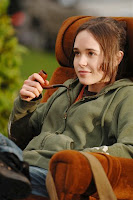 It turns out, however, that after an initial adjustment period to the dialogue (and a question about whether the film is set in the early ‘90s), Juno turns out to be planted in a feminist worldview, and is a film that teenagers, especially, ought to see. It was thoroughly enjoyable, funny and touching. I liked it so much that I watched it again, but when I started to write about it, what I liked about the movie became all the more confusing. I loved the music, although Juno MacGuff is way hipper than I was (or am), and I saw a representation that reminded me of myself at that age. I saw a paternal relationship that I never had and a familial openness that I’ve also never had. I saw characters who I wanted as my childhood friends and family.
It turns out, however, that after an initial adjustment period to the dialogue (and a question about whether the film is set in the early ‘90s), Juno turns out to be planted in a feminist worldview, and is a film that teenagers, especially, ought to see. It was thoroughly enjoyable, funny and touching. I liked it so much that I watched it again, but when I started to write about it, what I liked about the movie became all the more confusing. I loved the music, although Juno MacGuff is way hipper than I was (or am), and I saw a representation that reminded me of myself at that age. I saw a paternal relationship that I never had and a familial openness that I’ve also never had. I saw characters who I wanted as my childhood friends and family. 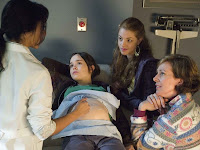 The film’s real progressive moment comes when Juno realizes that her idea of perfection isn’t perfect. She realizes that a father who doesn’t want to be there would be as bad as a mother who hadn’t wanted to be there. She sees that a father isn’t a necessity–or perhaps simply that two parents aren’t a necessity. Yet what does this all add up to mean? There’s certainly a moment of female solidarity (and this isn’t the only one, certainly, in the film), and a difficult decision that she makes independently. But, as with other conclusions I’ve made, I’m left with the question of “So what?”
The film’s real progressive moment comes when Juno realizes that her idea of perfection isn’t perfect. She realizes that a father who doesn’t want to be there would be as bad as a mother who hadn’t wanted to be there. She sees that a father isn’t a necessity–or perhaps simply that two parents aren’t a necessity. Yet what does this all add up to mean? There’s certainly a moment of female solidarity (and this isn’t the only one, certainly, in the film), and a difficult decision that she makes independently. But, as with other conclusions I’ve made, I’m left with the question of “So what?”Best Picture Nominee Review Series: Atonement
I’d like to start this review with a confession: Atonement is the second book in my long history of reading that has made me so angry, so upset, that I literally threw it across the room.
Both as an Academy Award-nominated (and winning, for soundtrack) film and as a book adaptation, Joe Wright’s Atonement succeeds. The film is a gorgeous and gritty, if frustrating, portrait of childhood, of war, of love, of lies and the lies one tells to correct them.
The first section of the film and novel set up the plot. The wealthy Tallis family has temporary custody of their lesser-off red-headed cousins, the Quinceys, and young Briony (Saoirse Ronan) is determined to lead them all in a play to celebrate her older brother Leon’s homecoming. Mother Tallis is sick in bed, and older sister Cecilia (Keira Knightley) is awkward around the son of the Tallis’s lawn worker, Robbie (James McAvoy) and excited to hear that her brother is coming home, despite news that he’s bringing along a friend, cocky Paul Marshall.
In direct contrast to this innocence comes Paul Marshall, introduced as a dapper gentleman who intends to make money off of the war with his Army Amo chocolate bar factory. He descends upon the safe haven of the nursery where Lola is meant to be watching over her twin brothers. “You have to bite it,” he says, handing her a bar of chocolate, his face stony.
The sexuality, too, of Robbie has another angle. His attempts at a polite apology devolve quickly into crude sexual expression. Robbie is faced with the sheer absurdity and irrationality of expressing sexual attraction to one who is of a higher class. Paul Marshall experiences the opposite problem, his power over Lola used to his advantage as he inflicts first rough treatment and then a rape in the woods. That power keeps Lola from seeing the truth, that she has been mistreated, brutally; Paul Marshall keeps Lola at his side, and she eventually marries him.
What follows is Rob and Briony’s means of atoning for their crimes. Rob, unable to fight the accusation against the wealthy and certain young Tallis, is sentenced to prison and then to fight in WWI. Briony, realizing years later that there were cracks in what she witnessed, that there are, perhaps, alternate truths, becomes a nurse in an attempt to undo some of the wrong she has inflicted upon Cecilia and Robbie.
A story is being crafted, an attempt to fill in the blanks. An attempt to create rational cause and effect as happens in all stories when we are young. An attempt to understand what must be truly random and unpredictable. Motive must be established.
But of course, things don’t follow a logical order. The wrong person is blamed for a tragedy while another gets off scot-free. War happens and the best and worst of us are lost, caught in causes we might not respect ourselves. Illness, a car crash, a lightning strike. Do we blame Briony, then, for trying to set order in her confusing world? Do we blame her for attempting to set things right that she helped to set wrong? I remember upon first completing the novel, my rage was so complete, so strong. I hated Briony for what she had done, for creating ugly and beautiful lies to cover up the truth, for believing that life was as simple as “Yes. I saw him with my own eyes.” I hated Briony for the very reasons that I love reading and watching films: writers and directors create lies for us, and we indulge in them. Fiction is called such for a reason–it isn’t real.
The soundtrack, interlaced with the sounds of a typewriter, never lets us completely forget that this is a story that is being crafted. It is no mistake that the first shot of the movie is Briony typing away at her play, “The Trials of Arabella,” taking her work very seriously. Briony expresses the difficulty of writing: that a play depends on other people.
The difference between play and story, as Briony postulates, are similar to the difference between novel and film. McEwan spends pages describing the intricacies of the vase, complete and then broken, whereas in a film, the vase is simply there. A long camera shot transports the viewer from room to room; instead of the turn of pages, the soundtrack interacts with the actions on screen instead of, for example, a rowdy neighbor or interrupting child pulling attention from the work.
While it is, in a way, refreshing to give the narrative over so completely to a woman in what is most certainly not a “chick flick,” and while Cecilia appears to be a strong, fierce woman in charge of her own sexuality, and while Briony, if not the most trustworthy of narrators, is more than skilled enough to do the job of telling this story, both of their stories center around Robbie. Even small conversations between Briony and Cecilia, Briony and Lola, Briony and a young nurse at training devolve quickly into a discussion of Leon, or Robbie, or marriage.
Any deconstruction of the traditional romantic narrative does have the potential to be feminist, however in this case, because the story is filtered not only through Briony Tallis’s obsession with that very narrative but through a male author and director, the deconstruction is seen as a loss of something good. A loss of cherished innocence, of childlike femininity.
There is no denying the technical mastery of Atonement. Simply look at the long shot as Robbie arrives at Dunkirk, despair and small hope surrounding him and swooning around him as the camera floats through soldiers waiting. Look at small consistent hints of cracks in the narrative, look at changes in perspective looped together by setting and soundtrack. Atonement is a master work of fiction and of film, but feminism is not something I believe it can claim.
